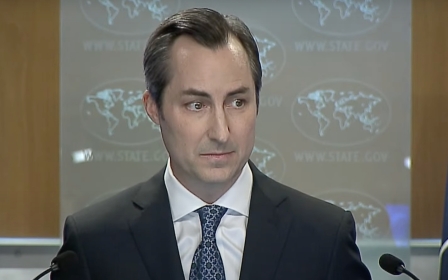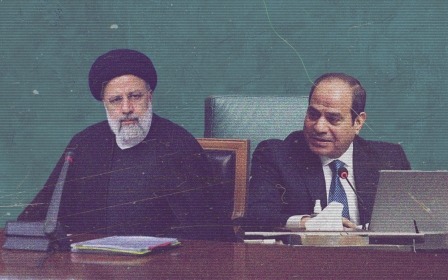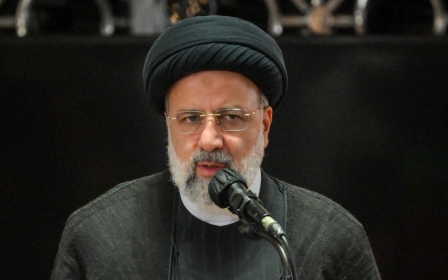Iranian press review: Iran to boost Venezuela's oil production, says minister

Tehran to support Caracas oil production
Iran's oil minister says Iran is set to help Venezuela expand oil production with new bilateral agreements signed amid President Ebrahim Raisi's visit to the country.
On Tuesday, the IRNA news agency quoted the minister, Jawad Owji, as saying that Iran would invest in “expanding oil fields” and “developing oil terminals” in Venezuela as part of the deals.
Owji said Iran has exported more than 2.8 million technical parts for refineries to its Latin American ally since Raisi took office in 2021.
“[Collaborating] in the petrochemical industry is now on our agenda, as Venezuela can produce 12 million tons of ammonia, urea and polyethylene,” he added.
Stay informed with MEE's newsletters
Sign up to get the latest alerts, insights and analysis, starting with Turkey Unpacked
Venezuela has one of the largest oil reserves in the world, but as a result of US sanctions, it has been unable to renovate oil industry infrastructure and has been hit by severe petrol shortages in recent years.
Washington has also imposed harsh sanctions on Iran’s oil, gas, and petrochemical industries as well as the banking system of Iran.
In response to US embargoes, the two countries have increased collaboration and boosted economic ties to get around international sanctions.
As Taliban cuts water, Sistan grows poorer
Residents in Iran's most impoverished province say the Taliban has sharply cut their water supply from the Helmand River, severely affecting their already dire living conditions.
Water flowing from the river, which begins in Afghanistan and ends in Iran's Hamun Lake, has long been critical for the incomes of Iranian farmers and fishermen in the Sistan and Baluchistan province.
The Shargh daily, in a report from the villages in Sistan, writes that residents in the region have fallen into extreme poverty following the drought caused by the construction of the Kajaki Dam on the river.
Turkey and the US finished the construction of the dam in 2019, and since the Taliban returned to power in Kabul, the use of the dam has seen Iran’s share of water from the river significantly.
An agreement between the two countries holds that Afghanistan must release 820 million cubic meters of water annually to its western neighbour, but the Taliban has not abided by the arrangement.
“Ten days after each rain in Afghanistan, the water would give a new life to Hamun, but now even if a flood hit Afghanistan, a single drop of water will not come to us,” a resident of Sistan told the Shargh daily.
Many suggest that the Taliban began a water war against Iran after the group tightened its grip on power.
However, Iranian officials, who at times have supported the Taliban during their 20-year war against the US and its western allies, have downplayed the situation between the two countries.
But at the banks of the shrinking Hamun Lake, one local told the daily that the scene looked like "a warzone".
"No, it does not look like a war," the report concluded. "It is an actual war. A water war, a war over survival."
No more speeches for MP who revealed 'SUV-gate'
Ahmad Alirezabeigi, a conservative MP from the northwestern city of Tabriz, has been banned from giving speeches in parliament after he revealed a corruption scheme involving legislators and other high-ranking officials.
On Monday, the ISNA news agency reported that, unlike other MPs, Alirezabeigi will no longer be allowed to give seven-minute speeches on any topic of his choice in parliament.
The report added that the ban was ordered by the Monitoring Board for Legislators’ Behaviour and enforced by the parliament’s board of directors.
On Wednesday, the Sazandegi daily wrote that more restrictions would be imposed on the lawmaker.
“After making a decision and ruling new punishments, Mr Alirezabeigi will face some monetary restriction,” the daily quoted the monitoring board’s spokesman, Mussa Ghazanfari, as saying.
Ghazanfari did not provide any detail about the potential fines and punishments that parliament would use to discipline Alirezabeigi.
Last month, it was reported that the MP was charged with “making baseless claims” as a result of information he revealed regarding a corruption case, dubbed “SUV-gate”.
Alirezabeigi was the first lawmaker to reveal that Iran’s former industry minister, Reza Fatemi Amin, had offered 75 SUV cars to lawmakers so he would survive impeachment.
Following Alirezabeigi’s revelation, another legislator, Ehsan Arkani, told local media that high-ranking officials in five ministries, public pension organisations and the presidential administration were also bribed by SUV cars.
*Iranian press review is a digest of news reports not independently verified as accurate by Middle East Eye.
Middle East Eye delivers independent and unrivalled coverage and analysis of the Middle East, North Africa and beyond. To learn more about republishing this content and the associated fees, please fill out this form. More about MEE can be found here.






